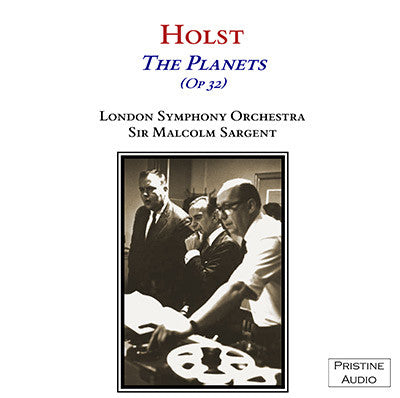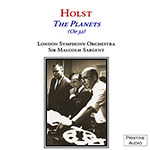
This album is included in the following sets:
This set contains the following albums:
- Producer's Note
- Full Track Listing
- Cover Art
From the moment I placed this Decca ffrr LP recording on the turntable I realised that we needed to offer this wonderful interpretation alongside our 78rpm masterpiece (PASC006, recorded some 9 years previously by Sir Adrian Boult). As you will read in our independent review below, both have a huge amount to offer the listener, and of course with the superior sound quality available from vinyl reproduction, this recording, perhaps the first of the LP era, is a great sonic improvement on the shellac version.
Throughout his life, Sir Malcolm Sargent was a passionate advocate of contemporary English music and he conducted a whole range of important first performances, including At the Boar's Head (1925) by Holst, and many more by the likes of Vaughan Williams, Walton and others. Hear him do justice to this long and distinguished heritage in this wonderful recording of The Planets.
HOLST The Planets
Recorded 17th, 20th & 21st May, 1954 at Kingsway Hall, London
Released July 1954 as Decca LXT 2871
London Symphony Orchestra
conducted by Sir Malcolm Sargent
Duration 47:12
Bill Rosen's Review
Sargent gives the single greatest performance
The immense popularity of Gustav Holst's "The Planets" as an audiophile showpiece has blinded us to the fact that it is a great piece of music. It has the melody, the orchestration, the drive, and the variety that none of his other works--not the English sunday school flavors of the "Choral Symphony" or "Choral Fantasy" nor the pub folksy joys of the band suites nor the hermetic eastern mysticisms of "Savitri" or the "Rig Veda Hymns"--possess. These two recording, both taken down closer in time to the work's composition than I am to their recording, re-affirm for me the Planet's magic in a way that modern recordings do not. Why that is, I do not know. I do know that the audio restorations have afforded me great pleasure and brought a tear to my eye more than once. The two recording are very different and I will compare them movement by
movement:
MARS: Boult's Mars starts out with very detailed, detache strings and reserved brass and works up to a great crescendo; the effect is very menacing. Sargent starts out with fairly strong brass, with strings more in the background; the effect is warlike, but not as menacing as Boult. Sargent has the better sound throughout, but Boult through his tightness seems to bring greater intensity. In the rushing quavers leading to the hammer-blows at the end, Boult projects a crushing sense of tragic inevitability while Sargent gives us a lot of excitement. Even with poorer sound Boult wins, but not by as much as I'd have imagined.
VENUS: Sargent was supposed to have a way with the fairer sex and so he certainly does here. Even allowing for his finer sound, Sargent's Venus is far superior to Boult's. His langorous oboe and flute, the sensuous strings, the tempi are so gorgeous as to make Boult's Venus someone sitting at the phone waiting for a call from her teen-aged boyfriend.
MERCURY: Sargent's Mercury is brilliant in the percussion area, but a little heavywight in the strings. Tempi are slow. Boult's version is lean, very fast, somehow more forward moving and just more (dare we say) mercurial?
JUPITER: Both Boult and Sargent play Jupiter magnificently; neither sentimentalize nor slow up at the great Elgarish tune; both are lean and fast. It is left to later foreign conductors to inject avoirdupois into this piece. Sargent's finer sound causes me to prefer his version. Neither version can capture the magnificent subterranean billowing strings upwelling near the end; that required future technology.
SATURN: Saturn can bring anti-climax as well as old age. Neither is brought by Sargent. He gives the greatest performance in either set of "The Planets" to Saturn. It is hard to describe as it brought a tear to my eye: the power and inevitability of the opening chords, the anguish and the warmth and serenity of the closing I've never experienced before. Boult in his grimness and austerity is swept away.
URANUS: Here Boult is brilliant. The central, mocking march is made to be so arrogant and cocksure that one must chuckle. Sargent cannot summon the same degree of cheek.
NEPTUNE: I fear that Sargent doesn't understand this music; neither do I. But Boult does and he makes me appreciate it. It's not just a salad of sonorities; it really conveys an otherworldly feeling under Boult's baton.
Well, in summary, it's almost impossible to choose between the two, which is surprising given Boult's and Sargent's contemporary reputations. Sargent has, in the Pristine Audio remastering, by far the best sound. Boult wins, by a slight margin, musically. Sargent gives the single greatest performance ("Saturn"). I intend to get them both. They have something that Bernstein and Karajan don't.

